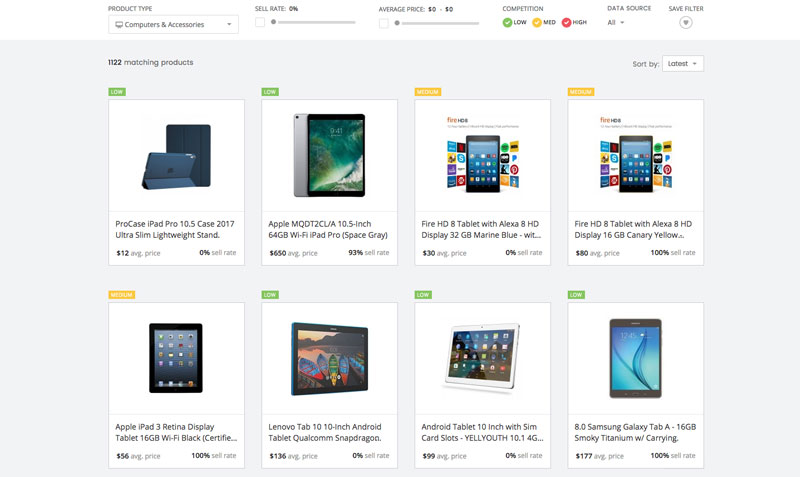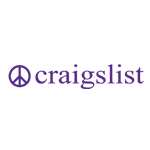.catsupplier { padding: 1px; margin: 20px 0; overflow: hidden } .catsupplier li { list-style-type: none; float: left; width: 33%; margin-left: -1px; margin-top: -1px } .catsupplier li p { margin: 0 } .catsupplier li p a { display: block; border: 1px solid #e4e4e4; padding: 10px 20px; white-space: nowrap; overflow: hidden; text-overflow: ellipsis } .catsupplier li p a:hover { background: #f2f2f2; text-decoration: none } @media (max-width:767px) { .catsupplier li { width: 50% } }
So you're in a funk with eBay, or maybe you're just looking out into the big wide world of selling platforms to see what opportunities lay yonder. Either way, you've ended up here, and you wonder about the top alternatives to eBay and which ones will suit you most.
No one can deny the power of eBay: Since 1995, eBay has held its place as one of the largest marketplaces in the world. It has turned thousands of hobbyists into PowerSellers and allowed thousands more to run profitable, at-home businesses. However, the eBay marketplace has evolved significantly in recent years, and various policy changes have prompted an exodus from eBay, as sellers look for other, more lucrative online marketplaces.
Where there's a will there's a way, and this rise in need for other platforms has produced more options than you can shake the proverbial stick at. So what are these eBay alternatives?
Below you'll find a description of each site, some information about who that marketplace is best suited to and a direct comparison to eBay.
Top alternatives include:
1. Amazon
 Amazon: A Major Marketplace like eBay, but Cheaper
Amazon: A Major Marketplace like eBay, but Cheaper
It's almost hard to believe that once upon a time Amazon was simply an online bookstore that dropshipped much of its inventory. The world's largest online book store, sure, but it only sold books. It has since exploded into one of the world's most visited websites, which offers millions of products across a range of product categories.
Amazon is similar to eBay in that you're opting into a very large marketplace that a lot of buyers trust, but the massive customer base comes at the price of higher fees and more competition.
In saying that, the large number of people looking to buy is a definite plus. With larger platforms like these, you need to think of it as getting a smaller slice of a larger pie. The slice may be a smaller in proportion to the whole pie, but the size of the pie means that you're still getting a decent amount. This huge traffic volume is probably the main reason that Amazon's Sellers Choice profitability rating was similar to eBay's.
Amazon also uses a built-in algorithm that will recommend your products to people who might be interested in them based on their search histories.
How Amazon Compares Directly to eBay
Want to know exactly what you'll get with Amazon that you haven't had with eBay? Here's the list:
Amazon is similar to eBay in that they're both large networks with a very large range of product categories.
eBay is essentially an auction house, so unless you choose to list your item as "Buy It Now" people will bid to buy and it might take a week to sell an item. Amazon is a traditional retail setup, and sales are instant with a fixed price.
eBay charges sellers for listing on the site, regardless of success, as well as taking a commission when a sale is made. You can list on Amazon for free, which is safer (you have nothing to lose if a listing is unsuccessful), but you'll pay $0.99 per item sold on top of the commission for the sale if you have a basic, free seller's account.
eBay isn't great about providing extra services to buyers, as it doesn't actually sell anything itself. It's up to the sellers to make good on customer service. Amazon, by comparison, offers numerous perks for those who've paid for the Prime membership (including 2-day shipping on all qualified orders), and all around-great customer service, which act as incentives to draw in more repeat buyers.
Who is Amazon Best Suited To?
Almost anyone, selling almost anything, will be able to run a business on Amazon. The sheer diversity of prospects is a powerful enticement. You just have to make sure that your prices are competitive enough to be a contender without sacrificing too much of your profit margins. If you're a small seller, this can be a bit more of a challenge, as there will be others selling in large quantities making pricing very competitive. That's where you need to make sure you're selling the right products.
How to Succeed on Amazon
One of the best ways to get ahead in a competitive space like this is to do a little market research into what you want to sell before you commit time, energy, and capital to actually selling it.
You can get an idea of how well a product will perform with the SaleHoo Labs. You can simply select a category (or select "all" categories), filter your products to see the ones with the highest success rate for the lowest competition, and you'll see some top options for you.

This way, you'll be able to sniff out some great product options for you to sell. You'll also get a smattering of additional information, like the average sale price or how many listings there are for that product. It's well worth checking out, especially if you plan to sell on Amazon.
If you'd like to see the most recent market research that we're done for you, you can always see our Market of the Week posts here. Some example ones you could look at are:
Cellphone stands
Earphones
Silicone Adhesive bras
e-Juice
These are just a few options that we've already looked into. Whatever you'd like to sell on Amazon, you can research it easily for yourself in the lab.
2. Etsy
 Etsy (as well as Ruby Lane): The Artsy-Crafty Platforms
Etsy (as well as Ruby Lane): The Artsy-Crafty Platforms
Etsy is doing very well as an online selling platform. It started in 2005 as an online community for crafters, artists and vintage enthusiasts, based in an apartment in Brooklyn, New York. Now it has 1.6 million active sellers, and 26.1 million active buyers. Not bad! It came out on top as the Sellers' Choice for ease of use, and it was the top pick for profitability after giants Amazon and eBay.
Etsy specializes in handmade and vintage goods, as well as craft supplies. Yes, this does limit what you can list on the network, and you might find that this rather niche-specific market isn't for you.
If, however, you make geeky things, costumes, jewelry, fashion accessories, home decor, cool gifts, and any number of other crafty items (or you know how to source quality vintage items or wholesale craft supplies), this is definitely the place to sell it all.
How Etsy Compares Directly to eBay
Want to know exactly what you'll get with Etsy that you haven't had with eBay? Here's the list:
You can sell pretty much anything on eBay (and yes, Amazon, too), whereas Etsy caters to the handmade/vintage/boutique niche.
eBay has mass-sold items and big brands, while Etsy's buyers enjoy the unique nature of the products they're getting.
Etsy is similar to eBay in that they both charge a listing fee, however:
eBay listings are up to 10 days, or 30 days for fixed price, while Etsy's listings last 4 months. This means your listings will last 4 times as long on Etsy before you'll have to renew them.
Etsy is cheaper charging only $0.20USD listing fee per item, and a fixed 3.5% commission. This fixed pricing model is much simpler than Amazon and eBay!
eBay is an auction site, whereas Etsy is for direct sales.
eBay gets more traffic than Etsy with its larger market and audience.
Etsy has better support, coming out several places higher than eBay on their Sellers Choice communication rating.
Who is Etsy Best Suited To?
Etsy is clearly best suited to any merchants with handmade items, vintage items, or craft-related resources. If you are an online seller who either produces your own unique product, or you source items that suit this market, then this selling platform is exactly what you're looking for.
How to Succeed on Etsy
If you create your own products, then by all means go ahead and list them and see how you go. If you'd rather give Etsy a go with some wholesale products, you have to be careful what you sell. You should read Etsy's Seller Guidelines before selling on this network.
Basically, Etsy is a place for unique goods or the supplies for making them. So if you're not making your own unique goods, stock up on the supplies instead by searching in the SaleHoo directory for "craft supplies," or search for specific types of supplies such as "fabrics" or "beads" or "clasps."
Some examples of items (and links to trusted supplier pages) that could provide what you need are:
Basic craft supplies
Beautiful beads, buttons, etc.
Fabrics
Jewelry-making supplies
Vintage items from the 1950s through to the 1980s
There are many others you could look into, the above are just a few of the trusted suppliers available to you in the SaleHoo directory.
Selling Platforms Similar to Etsy
I thought it worth mentioning that there are a few other sites like this one now, claiming to have more unique goods than websites like eBay and Amazon. Two in particular are doing very well. If you are interested in tapping into this market, then it could be worth trying your luck with:
Bonanza: This platform's slogan is "Find everything but the ordinary": Any quirky or unique-style items are great here. You're allowed to sell a wider variety of wholesale goods here, and it's becoming a very popular network. We'll talk more about Bonanza in the next section.
Ruby Lane: With a claim like "The world's largest curated marketplace for vintage & antiques," you're better off selling vintage-style goods and actual antiques here. Ruby Lane's strength is customer service, as reflected in their Sellers Choice customer service rating.
Look around these marketplaces to get an idea of the types of products people are selling, and then find suppliers for those types of items to start selling on these networks.
3. Bonanza
 Bonanza: A Fast-Growing Online Marketplace
Bonanza: A Fast-Growing Online Marketplace
Bonanza is headquartered in Seattle and, though it's relatively new to the e-commerce scene, it's doing incredibly well. The Bonanza marketplace encompasses more than 22 million items ranging from Godzilla garden gnomes to taxidermy alligators.
A lot of sellers are making good money on Bonanza. The site has merchants and shoppers in nearly every country around the world. More than 40,000 sellers have already created businesses here.
Bonanza is one of the easiest selling platforms to use, and its popularity is on the rise amongst sellers. In the Sellers' Choice awards, Bonanza has taken out the top rating for communication again, and were voted the most recommended selling venue. They were also recognised in Entrepreneur's 360 best companies list.
How Bonanza Compares Directly to eBay
Want to know exactly what you'll get with Bonanza that you haven't had with eBay? Here's the list:
Bonanza is similar to eBay in that a huge range of different products are being sold on both, so the sky's the limit for what you can sell.
Unlike eBay, however, many items on Bonanza are quirky and unique – extraordinary items do well here.
Because Bonanza doesn’t make money until its sellers do, you'll see much higher profit margins. It is absolutely free to list an item on Bonanza, and the average fee per sale can be as little as 3.5%, which is considerably less than eBay.
Bonanza is a fixed-price marketplace, meaning that buyers pay the listed price, as opposed to bidding against other buyers like in eBay’s auction-style listings.
Bonanza sends every item listing to Google and Bing, and sellers have the option to get more exposure by advertising their listings in other channels such as Pricegrabber, Nextag, and Bonanza's affiliate advertising program.
Many online sellers like to list their items on multiple platforms, which is why Bonanza has easy-to-use import features for listings on eBay, Etsy, and Amazon.
Although Bonanza's monthly traffic is lower than eBay's, the ratio of shoppers to sellers on Bonanza is much higher: 1,300 to 1 on Bonanza vs. less than 10 to 1 on eBay. That means far less competition between sellers, and far more chances for buyers to see your products.
Who is Bonanza Best Suited To?
Bonanza is best suited to any merchants who have something to sell online. Although Bonanza specializes in unique items and one-of-a-kind finds, it is not without its Justin Bieber perfume or Michael Kors handbags.
How to Succeed with Bonanza
Bonanza actually provides a really helpful guide for making sales on its platform, so that's definitely worth checking out. You could make a profit in any of its categories, but some of the top-selling ones currently include:
Home & Garden
Women's Fashion
Health & Beauty
Collectibles
These are all categories in the SaleHoo directory, so you'll find a wide variety of trusted wholesale suppliers there for sourcing these types of products.
Over the years, Bonanza has put emphasis on building platform-specific tools to make selling online much easier for entrepreneurs. They offer automatic eBay, Amazon, and Shopify importing, multi-item editing, and a marketing tool that allows sellers to provide targeted discounts to their buyers. You can learn more about these tools here, and use them to boost your profits on Bonanza.
4. Craigslist
 Craigslist: The World's Largest Online Classified Website
Craigslist: The World's Largest Online Classified Website
You can sell almost anything on Craigslist (including yourself, in the "personals" section). It's very "no-frills" in that there are no listing fees or selling fees, but it's super basic both in design and automation of the selling process.
It is, after all, just a forum. This means that you're pretty much on your own as far as selling and disputes go.
How Craigslist Directly Compares to eBay
Want to know exactly what you'll get with Craigslist that you haven't had with eBay? Here's the list:
eBay charges to list and sell items; Craigslist only charges for a small handful of post types, like job listings or vehicles. Products are free to list.
eBay will get involved in disputes if necessary, while you're on your own with Craigslist. So there's higher risk there.
Craigslist requires you to sell locally, and often you arrange for pick-up or drop-off of items. This limits your market compared to eBay, which usually involves shipping to a much wider area.
Unlike eBay, Craigslist has a "free" section where people aren't looking to make money, they're just trying to get rid of things they don't want. A lot of this will be junk, but you can keep an eye out for anything you could get and resell for a decent profit, especially if you're skilled at fixing things up.
Who is Craigslist Suited To?
Craigslist is best suited to sellers who are selling locally, and prefer to manage their transactions personally. It can be a good option for selling items that are perhaps too big or expensive to ship, such as furniture.
Some people like it because they can meet the people they're selling to, so there's a small social element. You can get cash-in-hand and you don't have to pay a network or shipping fees. In saying that, if you're paranoid about getting scammed or don't want to be personally involved with the transaction, then Craigslist might not be for you.
How to Succeed with Craigslist
Be careful with how you sell, as online transactions can be a little dodgy here, and if you get handed fake money, then it's basically your loss. Accepting payments in person can be good, but be careful (and safe!) when deciding where and how you meet people.
If you're good at spotting items that are worth a lot more than they're being sold for, or you have the skills to do up items that are a little lacklustre, you could make a neat profit here. For example, you might have an eye for valuable antiques, or you might know how to restore old wooden furniture. Or maybe you know how to sew something back to life. Pick up some workable free items or low cost items from craigslist (or browse local garage sales), work your magic, and sell the items for a higher price on Craigslist or other selling platforms. This can be a hit-and-miss strategy, so be sure to only select items that you're confident you could sell for a profit. And if items need work, make sure you have the time to do it, otherwise you may end up with a garage full of items you can't flip.
The downside of that strategy is it involves time, energy, and often a bit of luck to work. If you're a hobbyist it could be an enjoyable and profitable process, but if that's not your cup of tea, consider buying wholesale goods. List items that will sell well locally, save on listing and shipping fees, and you could make a hefty profit margin without the effort.
Some examples of items you could sell on Craigslist include:
Tools of all kinds
Kitchen appliances
Electronics
Bicycles (and related items)
You can find other wholesale suppliers in the SaleHoo directory. Just search for the types of products you'd like to sell and browse the trusted suppliers available to you.
5. eBid
.png?84438&1479856437) eBid: Another "Sell Anything" Marketplace
eBid: Another "Sell Anything" Marketplace
eBid is another marketplace similar to eBay and Amazon in that it is a platform for selling almost anything. Still, it's not as well known, so you'd be selling to a smaller pool of buyers.
It's definitely a lower-cost option than eBay or Amazon, but the profitability rating is also lower. The absence of listing fees and low 3 percent commission charged per sale does make this a low-risk market to test out, so if you're looking for a change, you've got little to nothing to lose here.
If you'd like a thorough run-down of eBid as an alternative to eBay, check out this post: Is eBid a Viable Alternative to eBay?
How eBid Directly Compares to eBay
Want to know exactly what you'll get with eBid that you haven't had with eBay? Here's the list:
eBid is similar to eBay in that they both have an auction-style format for product listings
eBay is a larger platform than eBid, and receives more traffic.
eBid is much cheaper than eBay, a lower-risk option.
They're both trusted marketplaces with a wide variety of product categories.
Who is eBid Most Suited To?
eBid is for you if you don't want to pay to list your items (as you have to on eBay), or if you'd just like to try your luck on an alternative (but similar) network. There's extra potential here if you know a thing or two about generating your own traffic.
How to Succeed with eBid
Basically, the lower level of traffic circulating on eBid (compared to eBay) is the only major downside. So if you promote your listings effectively elsewhere, such as social media or forums, you can enjoy your traffic as well as lower traffic.
Some examples of items you could sell on eBid are:
DVDs
Craft supplies
Books
Toys
There's definitely potential here, but also more work required to get your shop off the ground.
6. Your Online Store
 Your Online Store: The No-Competition Option
Your Online Store: The No-Competition Option
Selling on your very own website really is the ultimate option if you want to increase your profits and build a business that will become a long-term asset. If this appeals to you but you have no idea how to get started, don't worry. There's an easy way, which I'll mention a bit further down.
When selling from your own online store, you have to establish your own traffic, which can make it a little slower to get started than selling in a bigger marketplace. But once you're up and running, you don't have to compete with anyone else and your sales are all your own.
With this option, you can build up your own brand, rather than eBay's or Amazon's. When you sell on those platforms, who's really making the sale? They're spreading their brand, not yours. People say "I got it on eBay," or "I got it on Amazon," with no mention of the seller's name! It's ultimately you contributing to their marketplaces and their sales. Why not put that effort into yourself instead?
How Selling on Your Own Site Directly Compares to eBay
Here are the benefits of running your own online store, rather than selling on eBay:
You're building your own brand.
You can choose things like which payment forms to accept or tweak the design of your store to suit your preferences (and your branding).
You're not competing with any other sellers on the same platform.
This means you don't lose sales to others. It also means you don't have to use such competitive pricing. This makes way for larger profit margins.
Who is Best Suited to Owning Their Own Store?
Honestly? Pretty much anyone can get their own website and make a profit. Setting up your own store isn't nearly as hard as it used to be, and with a little time and effort, you can sell exactly what you want to, and how you want to.
You can learn about the pros and cons of owning your own website here, and decide for yourself if it's something you'd like to pursue.
How to Succeed with Your Online Store
Selling on your own website used to be expensive and complicated, but it doesn't have to be! If you don't have website-building skills and a heap of time, then store builders such as SaleHoo Stores are a really great option for you.
With SaleHoo Stores, there's no need for technical experience or knowledge; you can have your own store up and running in minutes and with just a few simple clicks of a mouse. You can see a SaleHoo store demo here.
Want a shop for yourself? It's super easy. Find out just how easy it is to set up your own online store here.
Then, you just have to get traffic to your site to encourage sales. There are a couple of great lessons readily available to help you with this, including "Get Buyers to Your Store" and "4 Ways to Advertise Your Store." There's also a community forum where you can ask questions and get advice.
7. Niche-Specific Sites
.png?84438&1479856463) Niche-Specific Sites: Smaller Markets but Highly Targeted
Niche-Specific Sites: Smaller Markets but Highly Targeted
Niche-specific websites are marketplaces where people only sell one type of product. So rather than the larger category-based marketplaces like eBay or Amazon, these sites hone in on one of those options and specialize in only that.
For example, if you were specifically interested in selling clothing, you might consider selling on a site like Poshmark. Or if you wanted to sell gear for the outdoors, you might try selling on GearTrade. Heck, if you were in the car market, why not try Cardaddy?
How Niche-Specific Sites Directly Compare to eBay
Much smaller networks with less traffic than eBay.
Highly targeted to buyers of that niche.
You don't have to compete with other categories for attention.
These sites are less obvious options, so some of your competition won't be here.
Who is Best Suited to Selling on Niche-Specific Sites?
If you're passionate about a specific niche of products, or you tend to bulk-order a small range of items, then niche-specific websites could be a great platform for you.
This will allow you to really focus on one market, and get to know the selling techniques that work best with that niche's buyer-audience.
How to Succeed with Niche-Specific Sites
If you haven't already, you need to really zero in on the type of product you'd like to sell and determine how much demand there is. A quick way to get a rough comparison of popularity is to do a keyword search. You can use a tool like the Keyword Research Module in AffiloTools.
Simply type in the name of the product or niche that you're interested in selling, and look at the monthly search volumes. This will show you how many people are searching for words or phrases to do with that topic, which is a strong indication of how much interest there is. If you're tossing up a few options, then try each one out to see which ones generally have more searches.
Once you've got a strong idea of what you'd like to sell, try searching in Google for "Places to sell [product type]." Look for marketplaces that cater to selling in your specific niche, like the examples we've already mentioned. Be sure to read about other people's experiences selling on them first. If these sites come across as genuine and promising, give them a go!
Finally, you need to find trusted suppliers with the best products to sell on these networks. For example, if you were looking for clothes to sell, you could try any of these:
Fashionable and affordable everyday wear (dresses, tops, pants/jeans, skirts, accessories, etc.)
Women's clothing and apparel (dresses, tops, bottoms, active wear, etc.)
Stylish/sophisticated women's wear (Contemporary and casual dresses, suits, and evening wear, etc.)
A huge supply of liquidated or surplus clothing stock (Women's apparel, dresses, accessories, etc.)
Swimwear (Bikinis, swimsuits, hats, cover-up dresses)
Plus-sized clothing
Or get something extra with styles from…
These are just some examples of the trusted suppliers you can access in the SaleHoo directory. If you've got a niche that you'd like to sell to, then type it into the search box there and find the best suppliers.
8. Your Suggestions
Have we missed a marketplace that you'd like to see here? If so, let us know in the comments below and we'll add it to this list. Stand-outs will be researched and added in our next update.
Current suggestions from the comments on this post include:
The Early Years Boutique: Gifts and products revolving around children and babies.
Swappa: "Gently used" mobile phones and tablets.
Neat Stacks: Mostly clothes and shoes, but also toys, electronics, and accessories such as phone cases.
MikList: Pinterest-style marketplace, strongly visual layout for selling.
BriskSale: Broad-category marketplace for sellers in the USA. There are no fees, but there's an optional commission option if you want others to find buyers for your products.
.pds-box { margin:0 auto !important; } .pds-input-label { margin-bottom:0 !important; } .pds-answer-group { padding: 0 0 6px !important; }
So Where Do I Sell?
There are a lot of options for you to choose from, so it depends on which of these following elements appeal to you most…
If you're looking for sites similar to eBay but cheaper, Amazon, Bonanza and eBid are the closest relatives.
Amazon is the only other network that's similar to eBay in size, with a giant range of products and massive customer base. So if that's a benefit of eBay you don't want to lose, this is an alternative to try.
Bonanza is similar to eBay in that the range of products you can sell isn't limited like it is on sites like Etsy, and they have a fantastic relationship with sellers, so it's worth trying.
Finally, if the auction-style is what you like about eBay, then eBid is the closest relative, although there's much less traffic circulating there so you'll have to do a lot more promotion to get your store off the ground.
If you have anything crafty or unique, you should definitely try the likes of Etsy or Ruby Lane.
These creative-style networks are really taking off, with Etsy coming in highest after eBay in overall Sellers Choice ratings. These networks might be totally wrong for the type of product that you're looking to sell, but if you're not tied down already, then these networks are worth the time to try out.
If you don't want to pay to list items until you've actually made a sale, try Bonanza.
This network is certainly on the rise as a strong alternative to eBay. The site has fantastic communication, and your listings will only cost you if they're successful, in which case it'll be a non-issue.
Amazon is also free to list items on, but it charges higher commissions. The high volume of traffic on Amazon may make up for that though, depending on how much competition you're facing and how much demand there is for what you're selling. You can always try listing on both and seeing which gives you the best returns. After all, neither will cost you anything until your items sell so you've got nothing to lose.
If you do decide to give it a go, remember to check out this guide to selling on Bonanza.
If you want to sell locally at no cost, try Craigslist (or even local markets).
This is a sort of cheap-and-nasty option where you're left to your own devices and often end up trading in person, but if you don't mind selling locally and being a little more hands-on in the selling process, then this is an option to consider.
If you like to sell locally consider other outlets such as local markets, especially if you enjoy this social element to selling. These environments are full of buyers and can give you an extra chance to show off your wares and add to your sales.
If you want to dodge the competition altogether, you should build your own online store.
If you want to avoid competition, listing fees and paying commissions, then consider running your own online store. It's a little more work to get set up (unless you use a store builder like SaleHoo stores) and to promote, but in the bigger picture it can be a hugely profitable option.
While at that, if you're looking for more profitable products to sell, you can learn more about Salehoo about how we can help you source profitable products from low cost suppliers. Be sure to also check these Salehoo reviews by our customers before you decide.
If you're really focused on one type of product, try niche-specific sites.
Finally, if you're an enthusiast for selling one type of product but you don't want to build your own site, it's worth looking into niche-specific marketplaces. Just do a quick Google search to see if you can find any in your area of interest.
If you're still unsure, you could look into any of the suggestions from the comments.
We haven't looked into all of your suggestions yet (unlike like the other options here), but they're suggestions made by other sellers and could be worth looking into.
Have we missed one that you'd like to see here? If so, let us know in the comments below and we'll do the research and add it to the list.
Do you think other sellers should jump on the eBay alternatives bandwagon? Let them know!
Read more: salehoo.com









